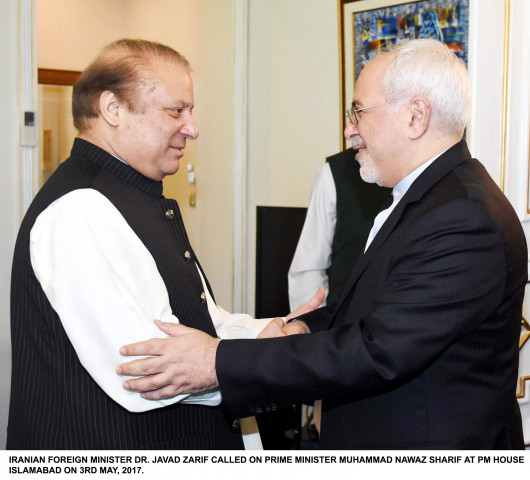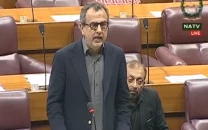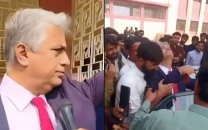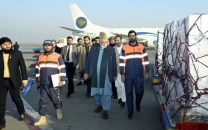Iranian envoy summoned over cross-border attack threat
Islamabad urges Tehran to avoid statements that could vitiate the environment of fraternal relations

In this file photo, Prime Minister Nawaz Sharif meets Iranian Foreign Minister Javad Zarif at the PM House in Islamabad. PHOTO: PID
Speaking with reference to the attack which took place on April 26 near the town of Mirjaveh in the southeastern Iranian province of Sistan and Baluchestan last month, the Iranian armed forces chief Maj Gen Mohammad Baqeri on Monday said Iran could not ‘accept continuation of the situation’.
“We expect the Pakistani officials to control the borders, arrest the terrorists and shut down their bases. If the terrorist attacks continue, we will hit their safe havens and cells, wherever they are,”Baqeri was quoted as saying by Iran’s state news agency, IRNA.
A day after his controversial statement, the Iranian Ambassador to Pakistan Mehdi Honardoost was called to the Foreign Office for conveying Pakistan’s concerns over the reported remarks of the chief of staff of the armed forces of Iran.
“It was conveyed to the Iranian ambassador that such remarks were against the spirit of brotherly relations existing between the two countries,” said a statement issued by the Foreign Office.
The statement pointed out that recently, the frequency of high level exchanges from both the sides had strengthened the bilateral cooperation and during the visit of the Iranian Foreign Minister Javad Zarif to Islamabad on May 3, the two sides agreed to enhance cooperation on the border issues.
Iran warns will hit militant 'safe havens' inside Pakistan
“The Iranian side was urged to avoid issuance of such statements that could vitiate the environment of fraternal relations,” the statement concluded.
At least 11 Iranian guards were killed and two others injured in the ambush whose responsibility was later claimed by the Jaish ul-Adl terrorist group in a statement.
Iran had claimed that the assailants had escaped into Pakistani territory immediately after the attack. Pakistan had strongly condemned the attack but made it clear that the incident had happened on Iranian side of the border.
Reacting to the incident, President Hassan Rowhani had issued a strong public statement urging Pakistan not to allow its territory to be used by such groups against Iran. He had claimed that certain countries’ proxy warfare was hurting the Muslim unity.
Just days after the attack, Iranian Foreign Minister Javad Zarif had also made an unannounced trip to Islamabad where he had held talks with Prime Minister Nawaz Sharif and army chief General Qamar Javed Bajwa.
The two countries had agreed to a series of steps including revival of hotline between the border guards of the two countries to prevent such incidents in the future. The Iranian foreign minister had also claimed that the Pakistani army chief agreed to deploy additional troops along the Iranian border.
Pakistan, Iran to revive ‘hotline’ between border guards
But the rare statement by Iranian military chief suggests that there is a friction between the two neighbours and that Tehran is far from convinced by the Pakistani assurances.
Islamabad and Tehran have had issues in the past but they rarely discussed or pointed finger at each other through public statements. That was the reason the officials in Pakistan were shocked by the statement of the Iranian general.
Independent observers believe that aggressive posturing by Iran could possibly be linked to the recent move by Pakistan to allow the former army chief General Raheel Sharif to lead a Saudi-led alliance against terrorism.
While Pakistan insists that its participation in the 41-nation alliance is solely meant to fight terrorism, Iran alleges that the main purpose of the Saudi initiative is to further the kingdom’s interests in the volatile Middle East region.



















COMMENTS
Comments are moderated and generally will be posted if they are on-topic and not abusive.
For more information, please see our Comments FAQ